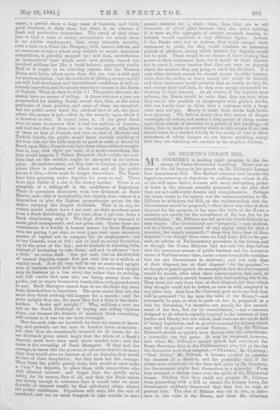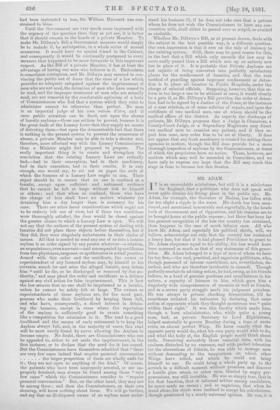MR. DILLWYN'S LUNACY BILL.
MR. COURTNEY is making rapid progress in the dis- charge of Under-Secretarial functions. There was no trace of the old leaven in his speech on Mr. Dillwyn's Lunacy Law Amendment Bill. Tho Radical reformer had become the ingenious setter-up of objections to making any reform at all, or the still more useful, because still more obstructive, picker of holes in the reforms actually proposed, on the plea that they are not sufficiently drastic and comprehensive. Perhaps the finest touch in the speech was the recommendation to Mr. Dillwyn to withdraw the Bill, on the understanding that the Government would be prepared," when there was time at their disposal for the purpose, to lay upon the table of the House a measure not merely for the amendment of the law, but for its consolidation." Mr. Dillwyn was led up to the Greek Kalends by easy stages. The Government are "prepared,"—not anxious, not in a hurry, not convinced of any urgent need for such a measure, but simply prepared ; " when they have time at their disposal,"—as though there were no Irish Land Bill in the pre- sent, no reform of Parliamentary procedure in the future, and as though the Prime Minister had not said two days before that the enormous arrears of public business and the enormous waste of Parliamentary time, make a most formidable combina- tion for any Government to confront ; and not only time at their disposal, but at their disposal "for the purpose,"— as though to guard against the assumption that the Government would be bound, after what their representative had said, to take up the question merely because they had nothing else to do. They must not only have time at their disposal, but time which they thought could not be better, or even as well, employed in any other way. And then Mr. Courtney goes on to say that they will be prepared " to lay upon the table of the House,"—not necessarily to pass, or even to push on, but to propound as a text for discussion, " a measure, not merely for the amend- ment of the law, but for its consolidation,"—not a measure designed to do what is urgently required in the interests of bare justice and liberty, but one which shall embrace the whole field of lunacy legislation, and so provide material for debates which may well be spread over several Sessions. Why Sir William Harcourt should so quickly have thrown over his subordinate, a journalist can but guess. It may be supposed, however, that when Mr. Dillwyn's second speech had convinced the Homo Secretary that in the Parliamentary play-bill of the day the characters were thus assigned,—" Charmer," Mr. Courtney ; " Deaf Adder," Mr. Dillwyn, it became needful to consider the chances of a division, and the possibility that if the debate were continued on the lines laid down by Mr. Courtney, the Government might find themselves in a minority. From that moment, a change came over the spirit of the Ministerial dream. Finding that they could not prevent Mr. Dillwyn from proceeding with a Bill to amend the Lunacy Laws, the Government suddenly discovered that they had no wish to prevent him. The part of Balaam was cut in two, in defer- ence to the rules of the House, and what Mr. Courtney
had been instructed to ban, Sir William Harcourt was con- strained to bless.
Until the Government are very much more impressed with the urgency of the question than they as yet are, it is better that it should remain in the hands of a private Member. To make Mr. Dillwyn's Bill a Government measure would simply be to include it, by anticipation, in a whole series of annual massacres. It would have no special friend in the Cabinet, and consequently it would be continually postponed to every measure that happened to be more fortunate in this important respect. As the Bill of a private Member, it has at least the advantage of having one man who believes in it. Enthusiasm is sometimes contagious, and Mr. Dillwyn may succeed in con- vincing the public out of doors that the vices of a law which provides no adequate safeguard against the imprisonment of men who are not mad, the detention of men who have ceased to be mad, and the improper treatment of men who are actually mad, are not removed by the comfortable optimism of a body of Commissioners who feel that a system which they exist to administer cannot be otherwise than perfect. No man is an impartial judge of his own vaiNon d'Ore, and • if once public attention can be fixed, not upon the abuses of lunatic asylums—those can seldom be proved, because it is the great fault of the Lunacy Laws that they supply no means of detecting them—but upon the demonstrable fact that there is nothing in the present system to prevent the occurrence of abuses, a private Member may be able to take a shorter and, therefore, more effectual way with the Lunacy Commissioners than a Minister might feel prepared to propose. The really important thing is to create and strengthen the 'conviction that the existing Lunacy Laws are radically bad,—bad in their conception, bad in their machinery, 'bad in their execution, bad in their results. It is easy enough, one would say, to set out on paper the ends at which the framers of a Lunacy Law ought to aim. Their object should be to ensure that no one is confined as a lunatic, except upon sufficient and unbiassed evidence that ho cannot be left at large without risk to himself or others ; and that when so confined, those who have the charge of him shall have no motive whatever for detaining him a day longer than is necessary for his cure. There are other lesser considerations which ought not to be entirely left out of • view, but if these two conditions were thoroughly satisfied, the door would be closed against the greater abuses to which a Lunacy Law is open. We will not say that the authors of the present system of dealing with lunatics did not place these objects before themselves, but if they did, they were singularly unfortunate in their choice of means. All that is needed to send any one of us into a lunatic asylum is an order signed by any person whatever—a relation, an acquaintance, even a servant—and accompanied by certificates from two physicians, surgeons, or apothecaries in actual practice. 'Armed with this order and the certificate, the owner or superintendent of any licensed asylum may, by himself or his servants, search for and seize the alleged lunatic, may detain him "until he die, or be discharged or removed by due au- thority," and may plead the order and certificate as a defence against any civil action for false imprisonment. This is how the law secures that no one shall be imprisoned as a lunatic, unless he cannot be safely left at large. The owners or superintendents of these asylums are, for the most part, persons who make their livelihood by keeping them full, and who have, consequently, a direct interest in detain- ing the inmates, except in cases where the reputation of the asylum is sufficiently good to create something like a competition for admission to it, The road to a good livelihood and the means of early retirement is to keep the Asylum always full, and, in the majority of cases, this road will be most surely found by never allowing the Asylum to become empty. No doubt, there are Commissioners who can be appealed to, either to set aside the imprisonment, in the 'first instance, or to declare that the need -for it has ceased. But the Commissioners have themselves admitted that "there are very few cases indeed that require personal conversation the larger proportion of them are wholly unfit for it ; they are not open to anything of the kind." Of course, the patients who have been improperly arrested, or are im- properly detained, may always be found among those "very few cases" which the Commissioners consider to "require personal conversation," But, on the other hand, they may not be among these ; and then the Commissioners, on their own showing, will know nothing about them. We will go further, stud say that an ill-disposed owner of an asylum must under- stand his business ill, if he does not take care that a patient whom he does not wish the Commissioners to have any con- versation with, shall either be passed over as stupid, or avoided as excitable.
Whether Mr. Dillwyn's Bill, as at present drawn, deals with the subject in the best possible way, is a different question. Our own impression is that it errs on the side of leniency to the existing system. Still, there may be good reason for this, in the fact that a Bill which only amends the law may be more easily passed than a Bill which sets up an entirely new law in place of it. It is probable that Private Asylums are not capable of being converted into perfectly satisfactory places for the confinement of lunatics, and that the true method of guarding against improper confinement or deten- tion is to place all lunatics in Public Hospitals, under the charge of salaried officials. Supposing, however, that this re- form is too large a one to be attained at once, it would clearly be a gain if, as Mr. Diliwyn's Bill provides, the order of deten- tion had to be signed by a Justice of the Peace, at the instance of a near relation, or of some solicitor of repute, and upon the certificate of two medical men, one of whom should be the medical officer of the district. As regards the discharge of patients, Mr. Dillwyn proposes that a Judge in Chambers, a County-Court Judge, or a Stipendiary Magistrate may direct two medical men to examine any patient, and if they re- port him sane, may order him to be set at liberty. It does not appear that any fresh machinery is created for setting these agencies in motion, though the Bill does provide for a more thorough inspection of asylums by the Commissioners, at times of which the proprietors have no notice. These, however, are matters which may well be amended in Committee, and we have only to express our hope that the Bill may reach this stage in time to become law this Session.



































 Previous page
Previous page